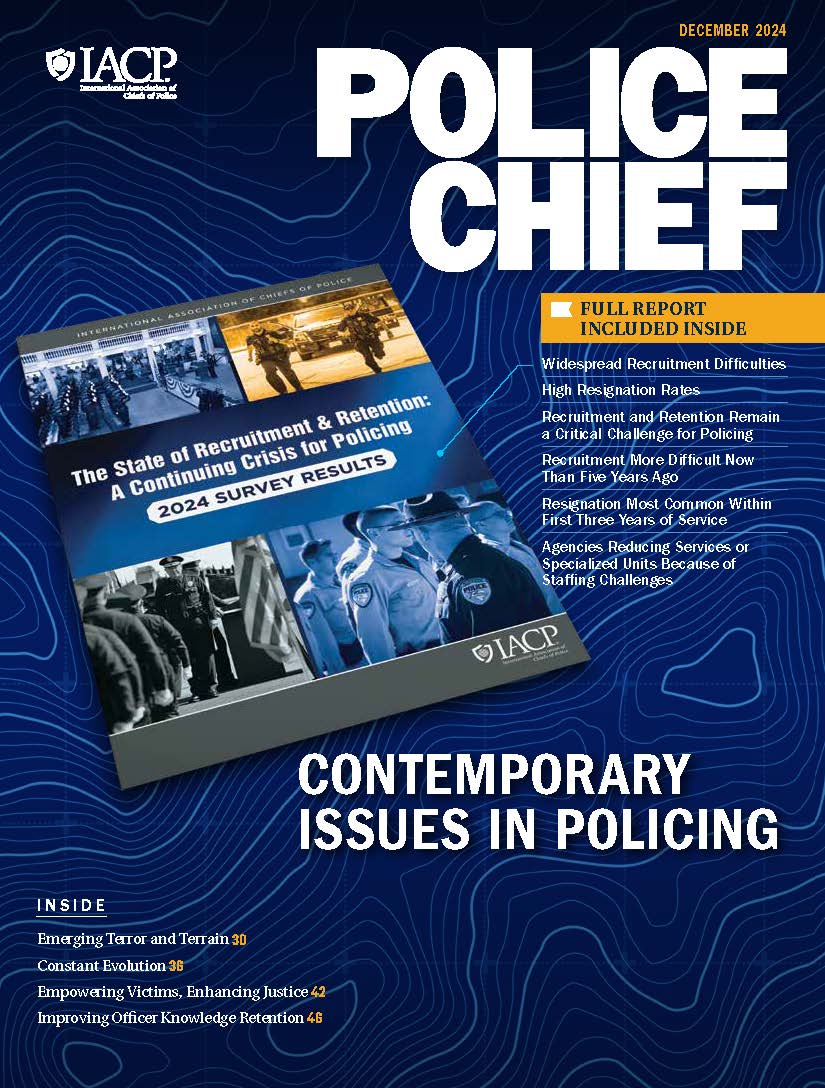Español Français Português عربى |
 In 2019, the first outbreak of COVID-19 occurred, and in a matter of months, the virus has spread around the globe, infecting hundreds of thousands and taking thousands of lives. With many regions of the world enforcing shelter-in-place mandates for their communities to slow the spread of COVID-19, law enforcement personnel represent one of the few professions who cannot stay home; instead, they are on the front lines and have to enforce the rule of law in these uncertain times.
In 2019, the first outbreak of COVID-19 occurred, and in a matter of months, the virus has spread around the globe, infecting hundreds of thousands and taking thousands of lives. With many regions of the world enforcing shelter-in-place mandates for their communities to slow the spread of COVID-19, law enforcement personnel represent one of the few professions who cannot stay home; instead, they are on the front lines and have to enforce the rule of law in these uncertain times.
In times like these, the safety and wellness of law enforcement should be a top priority. Enclosed with this issue of Police Chief is a collection of resources to assist law enforcement leaders and professionals throughout the world with considerations and recommendations for addressing COVID-19 in their communities and among their own men and women.
As law enforcement leaders, we have a responsibility to prioritize the safety and wellness of our officers from the moment they enter the academy through their retirement and beyond. On a daily basis, officers sacrifice their safety, time with their loved ones, and normal life schedules. This can affect officers’ mental wellness. In return, we must support the health and well-being of law enforcement personnel throughout their careers.
We know that this profession is one of the most rewarding, yet challenging, careers that an individual can have. For 127 years, the IACP has led the way in developing field-driven solutions for the most pressing public safety issues facing law enforcement. Those issues have evolved with new crime trends and rapidly changing technologies. Law enforcement wellness has evolved right alongside these issues, including topics such as officer mental health and suicide prevention, two of the most difficult challenges for our profession.
One of my presidential initiatives focuses on law enforcement suicide prevention. Over the last three years, the reported rate of law enforcement suicide in the United States has continued to increase and outnumber line-of-duty deaths. We must encourage officers to seek help when help is needed and remind them that services in the form of professional counseling, peer support, chaplains, and more are readily available. As law enforcement leaders, we can prioritize our officers’ health by speaking openly about the stressors we face on a regular basis. Having open conversations around mental health helps to normalize accessing help and services when needed. We have lost too many of our own to suicide and must continue to expand our definition of officer safety to place equal emphasis on mental wellness.
At the 2020 IACP Officer Safety and Wellness Symposium, the IACP released Preventing Suicide Among Law Enforcement Officers: An Issue Brief, a product of the National Consortium on Preventing Law Enforcement Suicide (the Consortium). The issue brief outlines the current state of knowledge about suicide in law enforcement. It also describes risk and protective factors, challenges to suicide prevention, strategies and best practices, and existing knowledge gaps. Along with the issue brief, the Consortium will produce a variety of resources throughout 2020, including a comprehensive report that outlines recommendations and considerations for the law enforcement profession to advance the field’s suicide prevention efforts.
This year, the Officer Safety and Wellness Symposium more than doubled in attendance from 2019, and the event included more than 40 workshops on a variety of officer safety and wellness topics. Eleven countries had representatives in attendance, and the President’s Commission on Law Enforcement and the Administration of Justice’s Health and Wellness working group convened during the symposium. The success of the event further demonstrated the importance of officer health and well-being across the profession and throughout the world.
With each phase of IACP’s officer safety and wellness efforts, the IACP has advanced endeavors in the field to address the wellness needs of law enforcement using emerging and data-driven strategies. These efforts include developing and implementing an evidence-based Law Enforcement Resilience Training Program. Developed and delivered in partnership with the University of Pennsylvania’s Positive Psychology Center, this training helps officers cope with the unique stressors they face on a daily basis and thrive, both on duty and off duty. In addition, through the Bureau of Justice Assistance–funded National Officer Safety Initiative’s Innovative Approaches to Officer Safety and Wellness Training and Technical Assistance project, IACP will soon release a wide array of online and printed resources to support the needs of officers of all ranks, assignments, and agency types.
Through each of these efforts, the IACP takes a broad, whole-officer approach that involves physical, mental, and organizational strategies to best meet the needs of the field. As the president of IACP, I will continue to carry the banner to support the health and well-being of law enforcement throughout the world and move the conversation around mental health and suicide prevention forward. d
Please cite as
Steven R. Casstevens, “President’s Message: A Comprehensive Approach to Health and Well-Being,” President’s Message, Police Chief 87, no. 5 (May 2020): 6–7.


